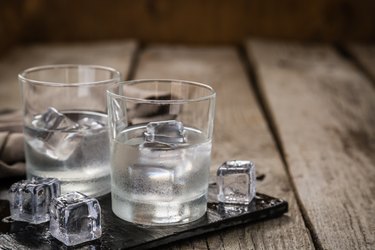
Enjoying a vodka drink after a long day is a nice way to relax, but it won't help you burn fat. Alcohol contains calories and provides no nutrition — otherwise known as empty calories.
While a cocktail every once in a while won't destroy your diet, too many will cause you to gain, not lose, fat.
Video of the Day
Video of the Day
Tip
Vodka and weight loss aren't compatible when you drink too much. Vodka has calories, and it can also cause you to make poor food choices.
How To Burn Fat
Weight loss — or, more appropriately, fat loss — has to do with a number of factors, including genetics. But at its core, it relies on creating a calorie deficit, or consuming fewer calories than you expend each day. When you remain in a calorie deficit for a period of time, your body will begin to burn fat stores for energy.
Your diet plays the most important role in successful fat loss. Eating nutritious foods and controlling your calorie intake will put you on the fast track to sustainable fat loss and improved health. Exercise is the other piece of the puzzle. Cardio exercise helps you burn excess calories to deepen the calorie deficit, and strength training builds muscle, which increases your metabolic rate — the speed at which your body burns calories.
Vodka and Weight Gain
Alcohol can hinder fat loss in a few different ways. Most importantly, it contains calories but offers no nutrients for those calories. One serving of vodka, which is 1.5 fluid ounces, according to the National Institutes of Health, contains almost 100 calories, per USDA data.
Further, if you don't drink your vodka straight, you have to take into consideration the calories in the mixers as well. Vodka drinks often contain soda, fruit juice and liqueurs, all of which are high in sugar. Six ounces of ginger ale has 62 calories, and the same amount of cranberry juice has 116 calories. Coffee liqueur packs 160 calories per serving. So your vodka drink could end up being well over 200 calories.
People typically drink vodka drinks in addition to their regular diet, and those extra calories add up. Consuming approximately 3,500 extra calories over your daily needs leads to a pound of fat gain, according to Mayo Clinic. The extra calories from a drink here and there won't do too much damage, but drink vodka drinks regularly and you could reach that 3,500-calorie mark more quickly than you realize.
Read more: 5 Hidden Health Benefits of Alcohol
It's Not Just Vodka Calories
The physical and mental effects of alcohol can also contribute to weight gain. When you drink, your ability to make decisions is impaired, and that includes making healthy food choices. After a couple of drinks, it gets harder to pass on the plate of French fries or order the salad instead of the cheeseburger. And you've probably noticed that you get the munchies after a night of drinking, even if you ate a full dinner.
If you go overboard, you risk a hangover and the fatigue, headache and other characteristic symptoms. Fatigue is also a trigger for poor food choices and giving into cravings. Eating a greasy breakfast to cure a hangover is a myth, but many people do it anyway and end up consuming hundreds of extra calories. Then, after dragging yourself through the day, you're going to feel a lot more like hitting the couch than hitting the gym.
The calories and physical and mental effects of alcohol mean that vodka and weight gain often go hand in hand. When you do indulge, do it moderately with no more than one drink if you're a woman and two drinks if you're a man, per recommendations from the Dietary Guidelines for Americans. Also, choose low-calorie mixers, such as soda water, and plan ahead to avoid binging on bar foods.
- NIH: "Factors Affecting Weight & Health"
- University of New Mexico: "Controversies in Metabolism"
- Journal of the Academy of Nutrition and Dietetics: "Time to Correctly Predict the Amount of Weight Loss with Dieting"
- NIH: "What Is A Standard Drink?"
- USDA: "Basic Report: 14037, Alcoholic Beverage, Distilled, All (Gin, Rum, Vodka, Whiskey) 80 Proof"
- USDA: "Basic Report: 14136, Beverages, Carbonated, Ginger Ale"
- USDA: "Basic Report: 14238, Beverages, Cranberry-Apple Juice Drink, Bottled:
- MedlinePlus: "Calorie Count - Alcoholic Beverages"
- Mayo Clinic: "Counting Calories: Get Back to Weight-Loss Basics"
- MedlinePlus: "Weight loss and alcohol"
- Dietary Guidelines for Americans: "Appendix 9. Alcohol"